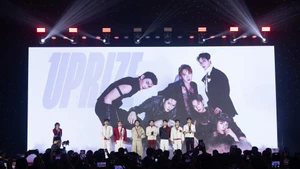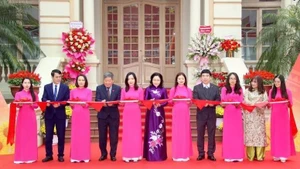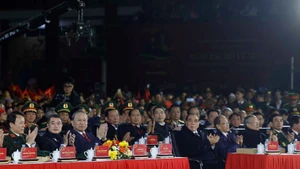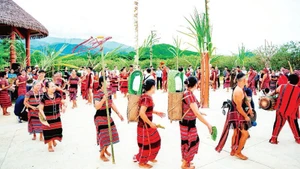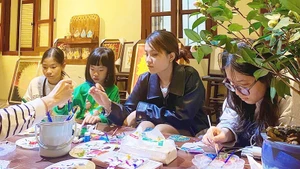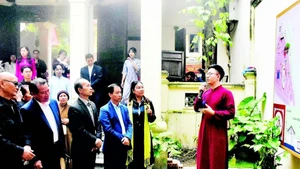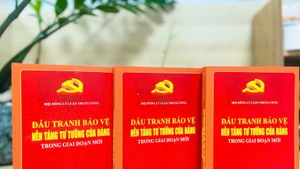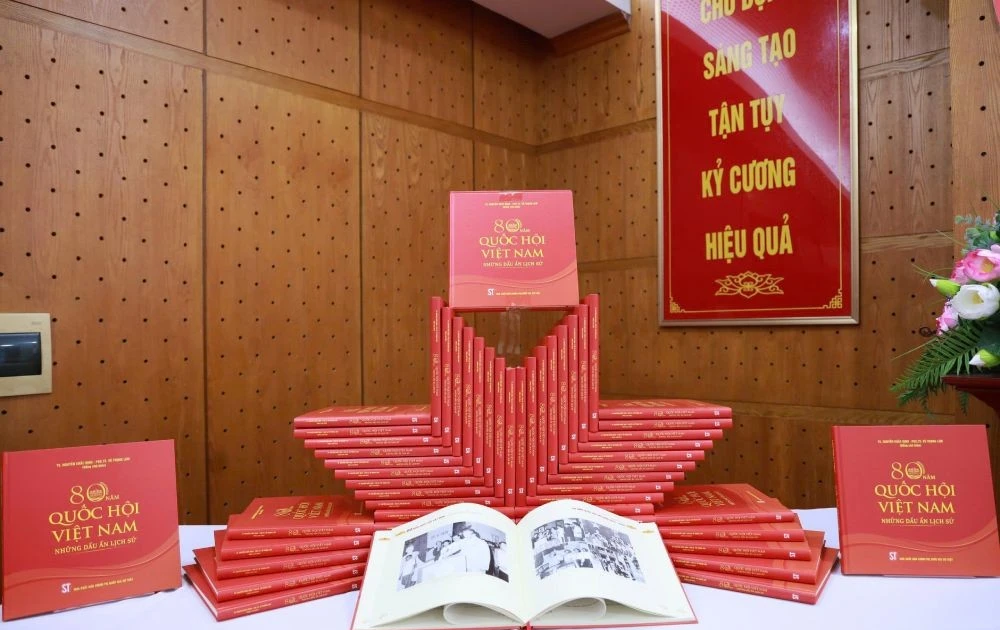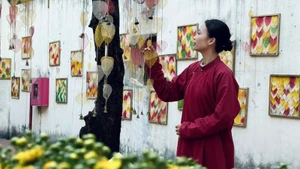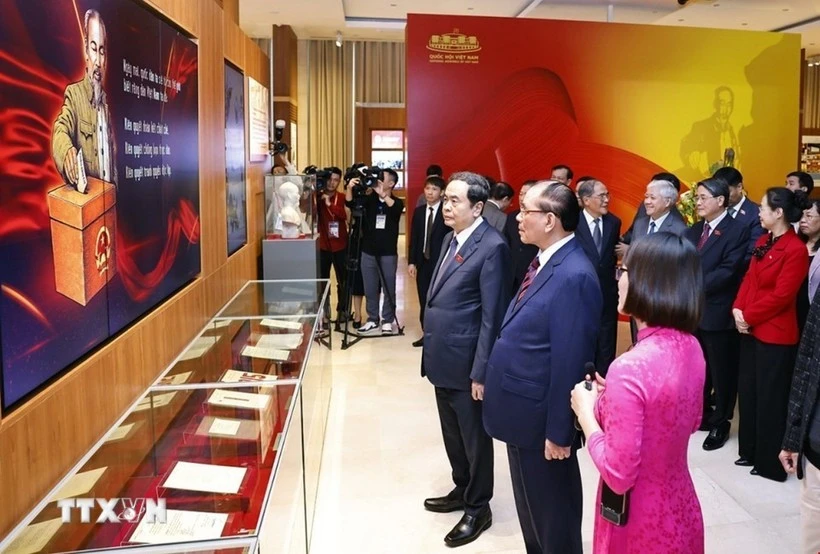Nhan Dan Online presents an interview with Tran Thuy Thien Kim, co-founder and Chief Executive Officer of Major Books in London.
Q: Major Books is a new publishing house, operating in Europe. Information in Viet Nam about its objectives, principles and activities remains limited. Could you outline Major Books for our readers?
A: Essentially, Major Books is an independent publishing house in London with the mission of bringing Vietnamese literature to the global literary community. The name Major Books can be loosely translated as “Big Books” or “Principal Books”, reflecting a direct response to the implicit hierarchy that still exists between literatures from different cultures and languages in the Western publishing industry.

Founded at the end of 2022, Major Books has already achieved certain milestones, such as winning the PEN Translates Award for the English edition of ‘Bien Su Nuoc’ - Water: A chronicle - by Nguyen Ngoc Tu, and securing support from Arts Council England for a trilogy of works exploring the portrayal of Vietnamese women across three literary periods: the medieval era, French colonial rule and the contemporary period.
Q: How did the members of Major Books come together? Were your studies related to publishing? And why, when many young Vietnamese abroad seek well-paid jobs, did you choose publishing — a notoriously low-income profession?
A: The three core members of Major Books are aged between 21 and 35, almost as young as the company itself. I studied literature, so my involvement in this field is not considered entirely “off track”.

Major Books is fortunate to have a “sibling” in Vietnam: San Ho Books, a book distribution and media company. Having the opportunity to establish and run San Ho in Vietnam for almost four years, I learnt a great deal and received generous support from colleagues and predecessors alike.
Your question touches on a truth no one wishes to say aloud — the harsh realities of publishing. In the UK and the US, on professional publishing forums, each month brings new posts and comments filled with frustration and exhaustion from those working in, or hoping to enter, the industry.
The average salary in publishing in Britain is among the lowest, making it difficult for young people to cover living costs, let alone save. That is why many, after a few years, decide to leave the profession. This reality is not unique to the UK; it reflects the global publishing industry.
Ultimately, I believe people come to books because of a love for literature and a desire to bring joy to others, just as books once brought joy to themselves. Yet, the fact remains: publishing is a business. Leaving aside the distinction between “marketable” and “niche” books, in general, books are essential yet not “essential” enough to drive daily consumer demand.
No publisher wishes to set prohibitive prices for access to knowledge. As a result, the retail price of a book rarely reflects the true investment behind it. A polished, complete work is the product of a collective process, involving countless costs and invisible efforts.
Unless a book sells several thousand copies, profits for an independent publisher are minimal — if not an almost certain loss. And yet, by some miracle, publishers find ways to produce the next title, often with ever greater quality. In return, they are rewarded with the fulfilment of doing what they love, and the thought that this small book may reach someone and bring them joy, just as books once did for themselves. For me, that alone is enough to stay — and enough reason why many continue to devote themselves to this path.
Q: From the Vietnamese works translated into English and published by Major Books, it is clear that your company is striving to bring classical literature such as The Tale of Kieu and Treasury of Vietnamese Folktales alongside contemporary titles like?
A: It is true that we harbour big dreams, but we can only promise to lay each brick, one book at a time, as the foundation for this ambition.
The origin perhaps lies in a quiet discontent that simmered through my ten years of studying abroad, something I was not even fully aware of. It began in the lecture halls of a university considered among the most advanced in international scholarship, when I realised that Vietnamese literature, like many literatures beyond the so-called “major” languages (English, French, German, Italian, Russian, Spanish), was relegated to the category of “minority” languages. This, despite the fact that those so-called “minority” peoples actually represent the vast majority of the global population — what is now often referred to as the global majority.
It also came from daily life, in conversations with international friends, where Vietnam was so often reduced to two things: pho, banh mi, coffee or war. Yet we have a whole body of literature and a vibrant culture which, I firmly believe, the international community would find fascinating, if only given the opportunity to access it, just as we ourselves have had the chance to encounter world literature.
We have a whole body of literature and a vibrant culture which, I firmly believe, the international community would find fascinating, if only given the opportunity to access it, just as we ourselves have had the chance to encounter world literature.
Tran Thuy Thien Kim
Q: While striving to introduce Vietnamese literature to English-speaking readers, Major Books has also worked to bring valuable English-language works to Vietnamese audiences. This is an interesting and unique approach, but one that requires specificity and detail. How has Major Books sought to achieve this?
A: Through San Ho Books company, we hope to introduce as many high-quality works as possible to Vietnamese readers. By taking literary, humanistic and intellectual values as our core criteria — rather than bestseller lists — we accept that these works may be harder to sell and may not generate profit easily. What matters is that they bring something meaningful to readers.
In addition, thanks to the two-way presence of San Ho and initiatives such as the New Writing Competition, Major Books is able to receive and publish works not only in Viet Nam but internationally as well. We hope this will encourage Vietnamese writers to keep writing, to stay committed to the literary profession, and to continue bringing fresh voices into Vietnamese literature.
Q: In deciding whether to publish a book, Major Books pays close attention to the original text and the quality of the translation, while seeking to show readers how the work has survived and thrived in its Vietnamese cultural and historical context.
A: Acknowledging that Vietnamese literature remains relatively unfamiliar to international readers, we do our utmost to ensure that they can experience each work as fully as possible. For us, this means translating in a way that conveys the essence of the Vietnamese original, its cultural and historical layers as well as its linguistic spirit. That is why we always give priority to native Vietnamese translators.
In Western publishing, houses specialising in translated literature often place greater emphasis on the target language (usually English) than on the source language. This greatly reduces opportunities for translators who work from their mother tongue into a second language. I do not agree with this tendency, as it diminishes the importance of the source language.
With global cultural integration, the history of migration and the rapid evolution of English itself, translation practices need to adapt.

Not long ago, Mark Harman criticised the way the Muirs translated Kafka into a kind of English that was overly smooth, ironing out the labyrinthine, knotty syntax of the German master. This reflects the pressing need for a shift in how both translators and readers approach translation.
I select Major Books’ translators with the firm conviction that they not only possess the linguistic sensitivity and command of English required for the task, but also a profound understanding of—and deep respect for—the Vietnamese originals.
Q: Vietnamese literary works translated into English and published by Major Books are now on the shelves of many bookshops in the West, and listed by global distributors such as Amazon and Asterism Books. With much still to be done, could you outline Major Books’ forthcoming plans as it continues its efforts to bring Vietnamese literature to the world more effectively?
A: In the near future, after publishing four works aimed at adult readers, Major Books hopes to reach younger audiences. We plan to release English translations of 11 tales from The Treasury of Vietnamese Folktales by Nguyen Dong Chi, with vivid illustrations by the talented artist Jeet Zdung—the first Vietnamese illustrator to be awarded the prestigious Carnegie Medal. We are also preparing a non-fiction picture book, Tet Across Viet Nam, introducing readers to New Year traditions across the country.

Beyond promoting Vietnamese literature and folklore, these projects are also intended for the children of overseas Vietnamese communities, enabling them and their families to preserve their cultural heritage without the barrier of language.
Together with illustrator Jeet Zdung, British-Vietnamese multidisciplinary producer Tuyet Van Huynh, the Museum of the Home in London, and with support from University College London’s innovation hub, we are planning a series of events in both London and Ha Noi to bring Vietnamese folktales to international audiences. This is Major Books’ flagship project for 2025. We hope to secure funding from Arts Council England and the British Council, but we would also warmly welcome support from individuals, organisations and institutions interested in contributing. Sometimes, just a word of encouragement is enough to keep us moving forward!
Thank you!
Tran Thuy Thien Kim, born in 1997 in Ha Noi, holds a Comparative Literature BA and an Ethnographic and Documentary Film (Practical) MA, both from University College London. She is currently the Publishing Director and Co-founder of Major Books.

